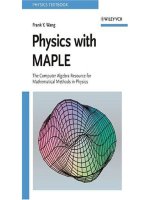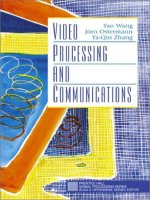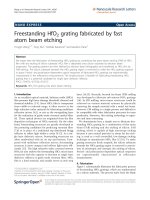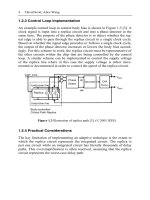Xuming wang
Bạn đang xem bản rút gọn của tài liệu. Xem và tải ngay bản đầy đủ của tài liệu tại đây (2.62 MB, 23 trang )
OMICS Group
OMICS Group International through its Open Access Initiative is committed to make genuine and reliable
contributions to the scientific community. OMICS Group hosts over 400 leading-edge peer reviewed Open
Access Journals and organizes over 300 International Conferences annually all over the world. OMICS
Publishing Group journals have over 3 million readers and the fame and success of the same can be
attributed to the strong editorial board which contains over 30000 eminent personalities that ensure a rapid,
quality and quick review process. OMICS Group signed an agreement with more than 1000 International
Societies to make healthcare information Open Access.
Contact us at:
Department of Metallurgical Engineering
OMICS Journals are welcoming Submissions
•
OMICS Group welcomes submissions that are original and technically so as to serve both the
developing world and developed countries in the best possible way.
•
OMICS Journals are poised in excellence by publishing high quality research. OMICS Group follows an
Editorial Manager® System peer review process and boasts of a strong and active editorial board.
•
Editors and reviewers are experts in their field and provide anonymous, unbiased and detailed reviews
of all submissions.
•
The journal gives the options of multiple language translations for all the articles and all archived
articles are available in HTML, XML, PDF and audio formats. Also, all the published articles are archived
in repositories and indexing services like DOAJ, CAS, Google Scholar, Scientific Commons, Index
Copernicus, EBSCO, HINARI and GALE.
•
For more details please visit our website: />
Department of Metallurgical Engineering
Flotation Chemistry and Mineral Processing
Xuming Wang ,PhD
Department of Metallurgical Engineering
University of Utah
Department of Metallurgical Engineering
Research Interests
•
The research activities involve both fundamental and applied aspects of Mineral processing ,
and surface & colloid chemistry in the development of flotation technology,
•
•
•
•
Flotation Chemistry of sulfide and nonsulfide mineral
Molecular Dynamics simulation
Hydrometallurgy
Waster water treatment and recycling
Department of Metallurgical Engineering
Surface Chemistry Lab
Department of Metallurgical Engineering
Determination of Flotation
Mechanism
Characterization
Hydrophobicity
Electrokinetic Studies
Adsorption
Interaction Forces
Department of Metallurgical Engineering
Spectroscopy Lab
Adsorption
Infrared Spectroscopy
Ex-Situ (without aqueous phase)
Transmission
Diffuse Reflectance
In Situ (in presence of aqueous phase)
Internal Reflection Spectroscopy
Department of Metallurgical Engineering
In-situ FTIR/IRS
Real-time Spectra Data
Quantification
Specification
Orientation
•Adsorption Density
•Chemisorption
•Conformation
•Adsorption Kinetics
•Physiorption
•Orientation Angle
•Adsorption Isotherms
•Precipitation
•Aggregation State
Department of Metallurgical Engineering
Spectroscopy Lab
Sum Frequency Generation Vibrational Spectroscopy (SFVS)
ω
ω
ω
vis
sum
IR
Sample Surface
ωSum = ωIR + ωVIS
SFVS is a surface-specific technique that provides vibrational spectra of molecules at interfaces. It
relies on the non-linear optical phenomenon of sum frequency generation.
Department of Metallurgical Engineering
SFG is a Powerful tool to Analysis Molecular Adsorption Structure at
Interfaces
HO
HO
HO
HO
HO
HO
Vis
H3C H3C
IR
CH3
H3C H3C H3C
CH3 CH3 CH3
H3C
SFG
CH3 CH3
O C O C O C O C O C O C
NH
NH NH NH
NH NH
O
O
O
O
O
O
Fluorite
Department of Metallurgical Engineering
Atomic Force Microscopy
(AFM) Lab.
Instrument used to measure properties of Surfaces
Mirror
Laser Diode
Detector
Sample
Z
X
Y
Department of Metallurgical Engineering
AFM Topography Image
Surfactant Head group Effect
Hydrophilic Mica Surface
Tertiary amine – dodecyl dimethyl ammonium hydrogen chloride, short cylindrical worm like structures
(200 nm scan)
Department of Metallurgical Engineering
A Typical Colloid Probe
Department of Metallurgical Engineering
Force measurement between a particle and air Bubble
Department of Metallurgical Engineering
Molecular Dynamics Simulation (MDS)
MD simulation of 40 DDA molecules near a quartz surface at pH 10
Red: Oxygen
Yellow: Silicon
Monolayer formation
Blue: Nitrogen
Green: Sodium
Department of Metallurgical Engineering
Flotation Principles
Air is dispersed in the suspension. Hydrophobic particles attach to air bubbles and are
collected in a froth phase while other hydrophilic particles remain in suspension
Department of Metallurgical Engineering
Metal Recovery
Exploration
Mining
Crushing and Grinding
Flotation
Refining
Department of Metallurgical Engineering
Waste Water Treatment
Flocculation and Flotation
Department of Metallurgical Engineering
Waste Paper Recycling
Deink Flotation
Many types of paper are subject to a deinking step in order to remove ink from the waste paper in
preparation for producing new paper Several processes are used, most commonly flotation or
washing.
Department of Metallurgical Engineering
Contact Information
Xuming Wang , Ph.D., Research Professor,
Department of Metallurgical Engineering
College of Mines & Earth Science
University of Utah
135 South 1460 East, Room 412
Salt Lake City, Utah 84112, USA
Phone: 801-585-1797
Email:
Department of Metallurgical Engineering
Powder Metallurgy & Mining Related Journals
Journal of Chemical Engineering & Process Technology
Journal of Material Sciences & Engineering
Journal of Nanomaterials & Molecular Nanotechnology
Department of Metallurgical Engineering
Powder Metallurgy & Mining Related Conferences
•
3
rd
International Conference and Exhibition on Material Science and Engineering 2014, San Antonio,
USA
Department of Metallurgical Engineering
OMICS Group Open Access Membership
•
OMICS publishing Group Open Access Membership enables academic
and research institutions, funders and corporations to actively encourage
open access in scholarly communication and the dissemination of
research published by their authors.
•
•
For more details and benefits, click on the link below:
/>
Department of Metallurgical Engineering









